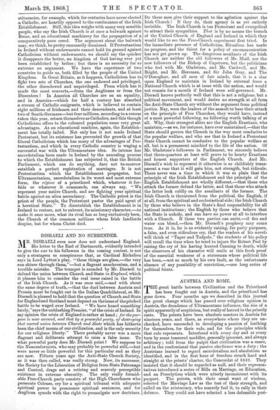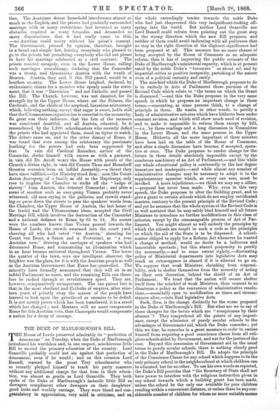AUSTRIA AND ROME.
THE great battle between Civilization and the Priesthood has been fought out in Austria, and the priesthood has gone down. Four months ago we described in this journal the great change which has passed over religious opinion in Austria, the decadence of Ultramontane influence, the rise of a spirit apparently of scepticism, but really of hatred to the priestly caste. The priests have been absolute masters in Austria for nineteen years, and there, as everywhere where they are un- checked, have succeeded in developing a passion of loathing for themselves, for their rule, and for the principles which that rule represents. Interfered with every day and at every turn by some tonsured meddler, generally ignorant, and always arbitrary ; told from the pulpit that civilization was a snare, and in the confessional that passive obedience was a duty ; the Austrians learned to regard sacerdotalism and absolutism as identified, and in the first hour of freedom struck hard and straight at the priests' charter, the Concordat of 1849. They insisted that it should be regarded as null, and their represen- tatives introduced a series of Bills on Marriage, on Education, and on Proselytism which were utterly inconsistent with its purport. The priests, with their usual want of wisdom, selected the Marriage Law as the test of their strength, and called on the aristocracy, who scarcely feel it, to rally in their defence. They could not have selected a less defensible posi-
tion. The Austrians detest household interference almost as much as the English, and the priests had gradually surrounded marriage with so many restrictions, had invented so many obstacles, required so many formulas, and demanded so many dispensations, that it had really come to this, —no Austrian could marry without his priest's consent. The Government, pressed by opinion, therefore, brought in a broad and simple law, leaving everybody who pleased to go to the priests, but permitting everybody who did not please to have his marriage celebrated as a civil contract. The priests resisted savagely, even in the Lower House, calling such marriages concubinage, declaring that the Concordat was a treaty, and threatening Austria with the wrath of Heaven. Austria, they said, if this Bill passed, would be a heathen country. The Lower House laughed, declared, by enthusiastic cheers for a member who openly made the state- ment, that it was " Darwinian " and not Catholic, and passed the Bill. The Church, however, was not daunted, for its strength lay in the Upper House, where sat the Princes, the Cardinals, and the chiefs of the sceptical, luxurious aristocracy, which, believing nothing, except that sugar is sweet, holds still that the Ultramontane organization is essential to the monarchy. So great was their influence, that the fate of the measure was considered doubtful, and all Austria, educated, be it remembered, by the 1,200 schoolmasters who recently defied the priests who had appointed them, stood on tiptoe to watch. The debate came on, and to the utter dismay of Rome, it was found that even among the aristocracy the passionate loathing for the priests had only been suppressed by
fear. In vain did Cardinal Rauscher, author of the Concordat, clothe himself with curses as with a garment, in -vain did Dr. Arndt weary the House with proofs of the Church's divine right, in vain did Counts Thun and Mensdorff threaten secession from an infidel Assembly,—a threat they have since fulfilled,—the Ministry stood firm ; men like Count Anton Auersperg, of a family as old as the Hapsburgs, only rose to implore the Chamber to strike off the " badge of slavery " from Austria, the detested Concordat ; and after a scene of emotion such as easy-going Vienna probably never witnessed, old men crying in the galleries, and crowds stand- ing en queue down the streets to pass the speakers' words from the Chamber, the Upper House of Austria, the last home of the feudal and the Ultramontane ideas, accepted the Civil Marriage Bill, which involves the destruction of the Concordat and a national defiance to Rome, by 65 to 34. No sooner were the numbers known than Vienna poured towards the House of Lords, the crowds swarmed into the court yard, cheering all who had voted "for Austria," shouting for Count von Beast, a Saxon and a Protestant, as " a true Austrian now," drawing the carriages of speakers who had denounced Rome, and commanding an illumination which in an hour became universal throughout Vienna. The lower the quarter of the town, says one intelligent observer, the brighter was the glare, for it is with the Austrian people as well as the Austrian Government that Rome has quarrelled. The minority have formally announced that they will sit in an infidel Parliament no more, and the remaining Bills can there- fore be rushed through at revolutionary speed. They are, however, comparatively unimportant. The one patent fact is that in the most obedient and Catholic of empires, after nine- teen years of priestly sway the masses of the people have learned to look upon the priesthood as enemies to be defied. It ia not merely power which has been transferred, it is a creed which has changed ; and Mentana will no more compensate Rome for this Austrian vote, than Chassepots would compensate a nation for a decay of courage.



































 Previous page
Previous page